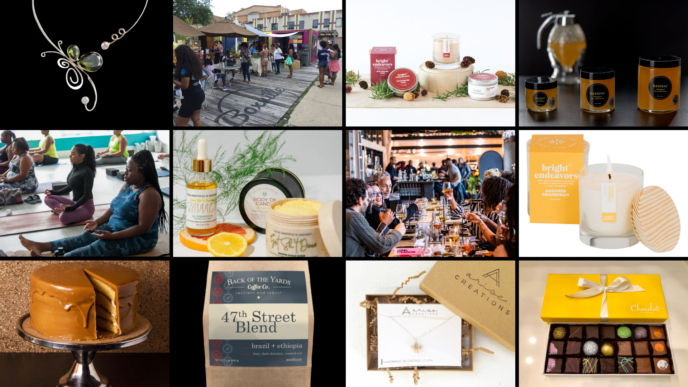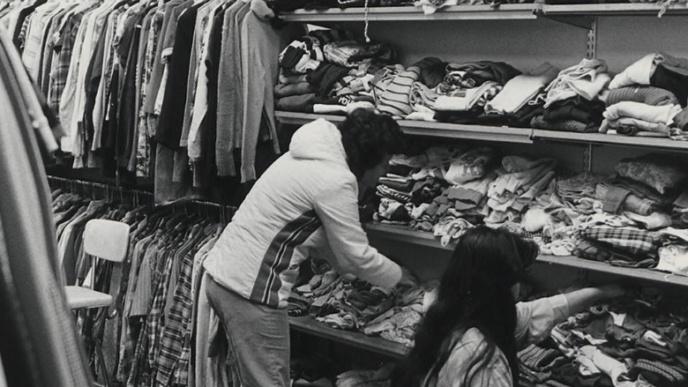2024 Holiday Shopping Guide
The Chicago Community Trust is committed to the vitality and well-being of the Chicago region and all who call it home. A key…

Nov 15 2016
It was almost exactly 100 years ago—on December 15th, 1916—that the Trust hosted a luncheon at the Union League Club to introduce The Chicago Community Trust. The luncheon featured Frederick Goff, who founded the world’s first community foundation in Cleveland.
I have it on good authority that at least one attendee at that luncheon bemoaned, “I bet the Trust will turn 100 before the Cubs win the World Series.”
I cite this historical example to remind us that the Trust exists within the context of the times: sometimes wildly exuberant, and other times turbulent and troubled.
It was just six months after the 1916 public launch of the Trust that the United States entered World War I.
Why are these facts worth remembering?
The end of World War I brought with it a flood of more than 6 million refugees—and a very public backlash against immigrants.
After the war, Chicago swelled to about 2.5 million people, of whom only 44% were English speaking. This prompted the Trust’s Americanization Survey and the formation of an Americanization Council that would operate until “the furor of prejudice had subsided and we were operating again on a higher level of mutual respect and good citizenship.”
In subsequent years, the Trust tackled issues of prenatal care with Jane Addams and Hull House. It also looked at the deplorable conditions of the Cook County Jail so that “youthful delinquents and first offenders… might be saved from becoming hardened criminals.”
And there was also a Trust study of the care of children with disabilities—back then referred to as “crippled children.”
In each of these are the antecedents of contemporary problems—for which the Trust continues to work with donors and other stakeholders to find innovative solutions to alleviate suffering, protect the most vulnerable and increase opportunity.
What matters more now than ever is that we come together as one Chicago—a city that’s unafraid of addressing the most challenging and complex problems, and respectful of the humanity of each of our neighbors.
Today we face new challenges and uncertainties. And what matters more now than ever is that we come together as one Chicago—a city that’s unafraid of addressing the most challenging and complex problems, and respectful of the humanity of each of our neighbors.
Every year, we invite to you to gather together with us for what we call the Trust’s “state of community” address.
Why do we do this?
Our mission calls us to honestly reflect on the reality of our fellow residents. Are we thriving, or not? Is opportunity abundant and fair, or not?
We cannot pretend that our great city does not face challenges. Our economy was dealt a staggering blow, first by the foreclosure crisis in 2006, followed immediately by the Great Recession. A decade into recovery, we have yet to perform at the level we know Chicago is capable of.
As our colleagues at the Voorhees Center have shared with us, the gap between our most privileged and our most vulnerable residents continues to widen. Some neighborhoods flourish while others are being hollowed out.
Tragically, the ongoing loss of human life has made this year the city’s deadliest in decades; and our community is still struggling with issues of public faith and trust in government.
But Chicago did not earn the title of the Great American City by folding in the face of adversity. This is a city that gains its strength from the challenges it faces and has the track record to prove it.
 The 2016 State of Community breakfast brought together donors and nonprofit leaders for a reflection on a year in the life of Chicago—and on the next steps for this community of concern.
The 2016 State of Community breakfast brought together donors and nonprofit leaders for a reflection on a year in the life of Chicago—and on the next steps for this community of concern.What is becoming more and more evident is that residents and community organizations are stepping in and stepping up to take back responsibility for their lives and their communities.
While people are dissatisfied with the state of their community they are also hopeful and feel that they can make a difference.
And that is what we see in Chicago’s neighborhoods: the seeds of hope and determination taking root and sprouting green shoots of education attainment, community re-investment, and new opportunities.
We see a very real and palpable energy and dynamism in our neighborhoods that seems contagious and inspiring.
We see:
What do all of their stories have in common? Proximity.
We are successful when we are connected with each other, when we listen and work together. To create more opportunities, we must be proximate to those without opportunity.
To this very point, we see the foundation community leaning in and redoubling our commitment to not just fund solutions, but to be part of the solution.
There is a group of 20 funders working together to help restore trust and legitimacy of law enforcement by ensuring the fair and inclusive implementation of the recommendations from the Police Accountability Task Force. Together we are providing vital funding to 11 community organizations that are hosting conversations this month and next to engage residents, block by block, to shape the policies, culture and practices of policing in our city.
A number of these funders responded at record speed to the community call for resources in anticipation of violence over the Labor Day weekend. Together we supplied $500,000 to 72 organizations for community events reclaiming safe spaces for residents. All in the span of 10 days! But the most meaningful benefit was forging new relationships between community groups and our foundations.
We are successful when we are connected with each other, when we listen and work together. To create more opportunities, we must be proximate to those without opportunity.
For the Trust’s part, this has been a year of transformation, beginning with the announcement of general operating grants—we call them GO Grants—to support the anchor organizations that are delivering essential services to residents and communities.
One year later, we have made 285 general operating grants totaling over $16 million. Through GO Grants we have also organized subject matter cohorts that create shared methods for measuring impact, and work together to advance policy and systems reform.
We are also focused on creating conditions for a sustainable and inclusive economy.
And in many cases we are doing this by partnering with donors to bring innovative solutions to long-standing challenges.
For example, in partnership with the Searle Funds at The Chicago Community Trust, we launched the Food to Market Challenge, our first-ever prize philanthropy initiative. The challenge: reimagine the supply chain so that more locally sourced food is available at your local grocery store.
We also launched a partnership with the City and the Metropolitan Planning Council to create the Great Rivers Project, which can be thought of as a metaphor for our times. What was once viewed as a liability for our city, our polluted rivers, is being transformed into a major asset that forms the spine of a livable city.
To meet the need for investment capital in our most under-resourced communities, we partnered with the MacArthur and Calvert Foundations to launch Benefit Chicago, our high-impact investing initiative.
Thanks to On the Table, civic engagement has become core to who we are. This year the Trust added a bit of rocket fuel to On the Table—we created the Acting Up Awards to fund great ideas pitched in 2-minute videos.
Some of the 64 award-winning projects included:
There is a clear desire from residents to have their voices heard and for their voices to matter.
In a recent New York Times op-ed, the Dalai Lama and co-author Arthur Brooks of the American Enterprise Institute advise:
“Everyone has something valuable to share. We should start each day by consciously asking ourselves, ‘What can I do today to appreciate the gifts that others offer me?’ …Each of us has the responsibility to make this a habit. But those in positions of responsibility have a special opportunity to expand inclusion and build societies that truly need everyone.”
What does this mean to the Trust? How do we think about our role and contributions?
We are committed to creating a more inclusive community. At our core, we seek to connect people power with institutional power. Human capital with financial capital. This is not an ‘either/or,’ but a ‘both together.’
Our work begins by inviting those typically not at the table to the table.
Our experience is that those who have been excluded have the deep experience, wisdom, and community-validated leadership to make a difference.
When we listen and learn from each other—
When we imagine and create, together—
We connect people with people, and the power of creativity and new ideas is channeled to where it matters most.
The result: we see each other through new eyes and appreciate our shared humanity.
We are committed to creating a more inclusive community. At our core, we seek to connect people power with institutional power. Human capital with financial capital. Not either/or, but both together.
For all of this optimism and evidence of progress, what still lies ahead is the challenge of racism and our quest to bring about conditions for a just, fair, equitable and inclusive community.
For the third year in a row, we’ve seen racial equity emerge as a top issue of concern during On the Table conversations.
Last year, on this stage, I stated that, as a community, we could no longer kick the can of racism down the road, leaving it to another generation to confront. If we do, we are complicit and acquiesce to the unfairness of inequity based on racial difference.
While clearly this history is not unique to Chicago, we have the opportunity to set our city apart by making a civic commitment to address this legacy head-on.
Next spring, we will sharpen the focus of On the Table by creating space for residents to deepen their exploration of racial equity. And yet, even though this issue is a leading theme every year, the dialogue will not be easy. We have heard from many that deeper conversations about race make them uncomfortable.
Unfortunately, that will not change as long as we shy away from this dialogue.
Yes, we may say the wrong things, yes we will tap emotions born of bitter experience that well up unexpectedly, but necessarily. But we can work our way through this discomfort and discover that by having honest conversations we actually better understand one another, come to value each other as fellow human beings.
This is a risk worth taking. What do we have to lose, compared to what we have to gain?
We recognize that this is just a first step on a longer journey—but it is the most important step to take.
Adapted from Terry Mazany’s remarks at the State of Community event at the Chicago Hilton on November 15, 2016. You can read the complete address here.

The Chicago Community Trust is committed to the vitality and well-being of the Chicago region and all who call it home. A key…

Addressing the basic needs of residents has always been a fundamental part of the Trust’s work. As homelessness and food insecurity rise in…

As our region’s community foundation, The Chicago Community Trust serves as a platform for change, connecting philanthropy to impactful outcomes. Throughout the year, the Trust unites…